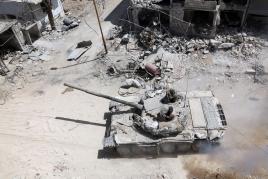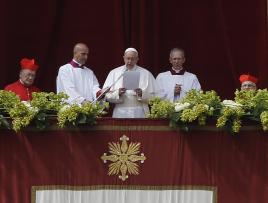
“It’s a delicate situation. I can only but acknowledge the deplorable division within the UN Security Council, especially given worrying developments such as the alleged use of chemical weapons in Douma city, East Ghouta.
The umpteenth rift within the UN Security Council is deplorable.”
The apostolic nuncio in Syria, Cardinal Mario Zenari, interviewed by SIR, commented on the recent developments in the Country threatened by winds of war fuelled by Russian and US statements, with the former threatening “to shoot down US missiles and destroy launchers” in case of aggression against Damascus, and the latter responding, with a Tweet by President Trump, with the threat to launch “new, intelligent missiles.”
International reactions. UN Secretary General Antonio Guterres reiterated his strong condemnation of the alleged chemical attack on the city of Douma. “Any confirmed use of chemical weapons, by any party to the conflict and under any circumstances, is abhorrent and a clear violation of international law.” Guterres called for an in-depth investigation and said he fully supported “the fact-finding mission by the Organisation for the Prohibition of Chemical Weapons (OPCW) that should be granted full access to the site “without any restrictions or impediments.” The UN Secretary General urged the Security Council “to redouble its efforts to agree on a dedicated mechanism for accountability.” His appeal fell on deaf ears: last night the US resolution calling for a new mechanism to investigate chemical attacks on Douma was trampled over by Russia’s veto. Twelve members of the Council voted in favour, Russia voted against, Bolivia and China abstained. Also WHO – World Health Organization – is deeply alarmed by reports of the suspected use of toxic chemicals in Douma. Drawing from official sources, such as “Health Cluster”, WHO reported an estimated
“500 patients presented to health facilities during past Saturday’s attack on Douma, exhibiting signs and symptoms consistent with exposure to toxic chemicals. More than 70 people sheltering in basements have reportedly died, with 43 of those deaths related to symptoms consistent with exposure to highly toxic chemicals.
Two health facilities were also reportedly affected by these attacks.” WHO demands “immediate unhindered access to the area to provide care to those affected, to assess the health impacts, and to deliver a comprehensive public health response.” The gravity of the situation was underlined this morning by Pan-European air traffic control agency Eurocontrol that warned on the possible launch of air strikes into Syria “in the next 72 hours” and warned aircraft flying in the eastern Mediterranean to “exercise caution.” AP reported that France and Great Britain have consulted with the US Administration on a possible joint military response to be carried out by the coming weekend.
Unheard appeals. Thus Pope Francis’ appeals for peace in Syria have fallen on deaf ears.
“Pope Francis has appealed for peace in Syria on many occasions, twice in a week, on Easter Sunday and the on the following Sunday – the Nuncio told SIR – The Pope always refers to the “dear”, “martyred” Syria, exemplifying his affection and concerns for this Country.”
It seems that peace has disappeared from the political agenda of world leaders, remarked Msgr. Giovanni Ricchiuti, Archbishop of Altamura-Gravina-Acquaviva delle Fonti, President of Pax Christi Italy, on the occasion of the 55th anniversary of “Pacem in terris”, the latest encyclical of John XXIII, published on April 11 1963. “Given the situation in Syria, Gaza, Congo, for a long time we have been wondering how come this vision propounded by John XXIII in ‘Pacem in Terris’ is so scarcely acknowledged.
We are challenged by a rationale that stubbornly refuses to undertake the path of negotiation and dialogue
called for once again by Pope Francis last Sunday with reference to the situation in Syria.” The President of Pax Christi noted that “the ongoing disconcerting news of air raids, armed interventions”, “are evidently upsetting, for statements and stands are no longer enough. Once again we see distinctions being made between just and unjust wars. But war is always utter madness.”













